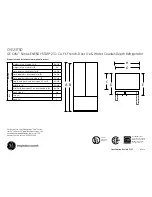
Cleaning and Care
Cleaning and care
For hygienic reasons, the appliance interior,
including interior accessories, should be
cleaned regularly.
The appliance should be cleaned and
maintained at least every two months.
Warning!
Danger of electrical shock!
The appliance should not be connected to
the
during cleaning.
Before cleaning, switch the appliance off
and remove the plug from the
switch off, or
the circuit
breaker or fuse.
main power supply
main power
supply,
shut off
Notice!
Remove the food from the appliance
before cleaning. Store them in a cool
place
well covered.
Never clean the appliance with a steam
cleaner. Moisture could accumulate in
electrical components.
Hot vapors can lead to the damage of
plastic parts.
Ethereal oils and organic solvents can
attack plastic parts, e.g. lemon juice or the
juice from an orange peel, butyric acid,or
cleansers that contain acetic acid. Do not
allow such substances to come into
contact with appliance parts.
Do not use any abrasive cleansers.
and keep
Clean the appliance and the interior
accessories with a cloth and lukewarm
water. Commercially available dish
washing detergents may also be used.
After cleaning, wipe with fresh water and
a clean dish cloth.
Accumulation of dust at the condenser
increases energy consumption; clean the
condenser at the back of the appliance
once a year with a soft brush or a vacuum
cleaner.(Only for the outside-condenser
product)
Check the water drain hole on the rear
wall of the refrigerator compartment.
Clear a blocked drain hole with the aid of
something like soft green peg, an be
careful not to
any damage to the
cabinet by sharp
After everything is dry, the appliance back
into service.
create
objects.
Empty the appliance.
Pull out the power plug.
Clean thoroughly (see section: Cleaning
and Care).
Leave the door open to prevent odours.
Taking the appliance out of service
Defrosting with NoFrost
The NoFrost system automatically defrosts
the appliance.
The moisture condenses on the evaporator,
is periodically defrosted and evaporates.
The appliance does not have to be
manually defrosted.
14
Summary of Contents for RB292F4WB1
Page 1: ...RB292F4WB1 RB292F4WG1 ...
Page 3: ...General safety 3 ...
Page 4: ...Caution risk of fire 4 ...
Page 5: ...Daily use 5 ...
Page 6: ...6 ...
Page 19: ......





































